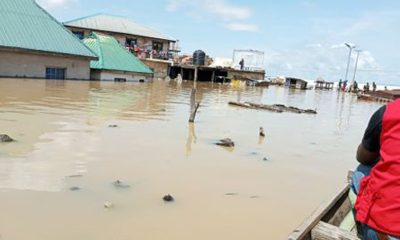OPINION
FEMA Has Five Minutes Response Time to Disasters -Abbas Idriss

The Federal Capital Territory Emergency Management Agency ( FEMA) stands out as a frontline disaster management organisation in the country that is matching technology with innovations and competence to produce excellent performance for the benefit of residents.
The Nigeria Hydrological Agency has released what one could call a gloom picture of flooding for the remaining part of the year. The report paints a very worrisome picture about the environment especially flooding across the country and of course, FCT is involved, I want you to talk to us about the flooding outlook of 2021?
Actually, if you look at the global world you will realize that the whole environment and the climate has changed. In those countries that we call the developed countries you see the devastating flooding like in Germany, part of China and some other countries, it has been very devastating and Nigeria can not be an exception because we are part of the global world so we have this prediction that we are going to have above normal rainfall this year. The rain is going to be very short but very plenty or heavy and we have started experiencing it like the rainfall in Jalingo last two weeks that resulted in flooding was quantified to be rain that was supposed to fall in two weeks consistently everyday, so with that they could be flooding.
In some areas like FCT, it has also been predicted that we are going to have flooding and two Area Councils are going to be affected like AMAC and Gwagwalada area councils.
The rest will have probable flooding. So the main cause of this is the climate change as well as the global warming, which is also affecting Nigeria. In fact we can not also rule out the way we handle our environment, the way we dump refuge, our tap lining is very poor and so this can also add up to the climate change or effects of the climate change and leads us to certain situations that are really worrisome.
We have three major kinds of flooding; which of them is likely to confront residents in FCT…?
Well the two types of flooding that would likely affect FCT is the Urban flooding and the flash flooding. The Urban flooding has to do with the development that is going on in the city, you know Abuja is a growing city, people are building in the areas that were marked for flood prone areas most times people build on it, the green areas were also been build on by some people illegally so by the time you build on this places you are also blocking the areas that are supposed to allow water to populate and therefore water has to run and in the process of running, it gets stocked somewhere because somebody has blocked the water ways by erecting another structure, dumping refuse there would definitely cause flooding around the area.
The second one is the flash flooding, which is so devastating and also very dangerous to mitigate because it builds up over time and then its more severe and dangerous and can kill instantly.
These are the kinds of flooding that can trap people who are driving on the road or they are just in their houses and see water coming in, before you know it everywhere is filled up to the brim. These are the two flooding that might be experienced in the FCT.
So having received alert or early warning on this, what’s the level of preparedness in terms of response?
Even before we got the warning from the Nigeria Metrological Agency in February, we had already commenced our preparedness. How do we do that, by really seating down to debrief ourselves and look at what happened last year, the previous year, we look at the areas that were flooded and then analyzed the cause of the flooding and also look at the areas that we are anticipating flood, maybe as a result of human activities around the areas then we now carry out structural measures by ensuring that all the relevant MDAs that are supposed to work in those areas really carried out the work they are supposed to do in those areas.
When the early warning as passed by NIMET and the quantity of rainfall expected also we now have to wait for the NISA to come up with the outlook of the flooding.
And when they come out with the outlook of the flooding, the next thing we do was to reconvene the stakeholders meeting to discuss the flood management in the city, where the NIMET, NISA will be there and would give us the real outlook as it affects FCT and then tell us the implications. But before then we have already analyzed the implications of the report of NIMET and NISA, which we advised the FCT administration which was cascaded to all relevant agencies and SDS because we had to look at the implications on road network, rail lines, on agriculture, health and so many others and then we now advised the honourable Minister by way of instruction on what necessary things those SDS should do and especially agric, the kind of crops farmers should grow because of the shorter period rain would fall and the expected period of the amount of rain that is going to fall.
The flood that we can prevent we do so and the ones we can mitigate, we mitigate.
In terms of relief materials, we give less priority to relieve materials, we focus more on prevention rather than reliefs, we work hard to ensure that there’s no casualties, or loss of properties as a result of flooding in the FCT and that’s why our team are always out on monitoring and surveying the areas in the city, to ensure that the water level does not go beyond what we expected and also those areas we feel are threatening lives of the residents especially those slip floods are blocked so that people will not use them and get flash flood build up.
Now lets look at compliance of the residents, you passed the advisory to the FCT Administration, how would you assess the level of compliance in terms of the advisory yoh have rendered, having people to relocate to less flood – prone areas and other requirements to prevent the disaster?
Well, that is the area that we are still battling with the residents of the FCT and maybe because of our culture, people would not want to isolate themselves, they prefer to move to a friend’s house or relation somewhere but definitely there are reasonable levels of compliance by the residents, but where we are having issues are those we call the elites, they don’t want to move an inch from where they are, probably because of the facilities and amenities they enjoy there.
If you look at the history, most people that lost their lives in the FCT are the elites because of their non- compliance to the early warning, like don’t drive in a running water they would go and drive there; don’t build on water ways they would not obey and when flood comes, it carries them away, so these are the issues we have with the residents.
From the previous experience, what were the losses, the level of damage that was experienced in the preceding year…?
The preceding year, we loss about 13 people all over the FCT and it was really a high number because we never expected that, as I said at a go, five people in one family at Giri, were carried away by water and some were trapped as they were driving and then some were carried away because the children went to bath in the river, the water just overwhelmed them and took them away. It was really a sad story for them last year coupled with the COVID-19 that we had, which was part of those hiccups that did not really allow the agency to properly equip themselves.
Also, properties were damaged. So these are the things that we saw and feel that it is too much and we have to put a stop to it because all those things are avoidable things, they are not natural hazards, it was something created by residents by dumping refuse at water ways indiscriminately.
We had a number of disasters recently in some parts of the country and one thing that has continued to resonate is the delay in the intervention by the disaster management agencies like the recent fire disaster at an Abuja Supermarket and the boat mishap that happened in Kebbi, where the locals ended up commencing the rescue activities. As a practitioner can you speak on the issues, why do we suffer delays when we have disasters from the relevant agencies and what are the factors.?
First and foremost is the communication gap, the people don’t communicate on time, most of the time you find out that if there is fire in the city before they can call the fire service they would make an attempt of doing the job of rescue, the people around the houses first make an attempt to extinguish the fire till when they are overwhelmed they call the fire service and when the fire service comes, the youth would now jump on them that they did not come on time, other times this our own response time, which we have agreed is five minutes, if you call us on time wherever you are.
Coming to the locals carrying out rescuing in some areas, in the FCT we encourage them and we equip the locals because we feel they should be the first to respond when we are not available. For instance, considering the distance between here and Abaji, if there is flooding in Abaji and some people were taken by water before we would get there they might have reach the confluence point in Lokoja, but if we have the local divers whom we would call and integrate into our own respond team now in the FCT Emergency Management Agency, we give them the modern training and equip them with modern equipment so that they can carry out rescue. At every point in time we advised them to go in carry out the rescue before we arrive, we have given them the line to call to let us know what is happening before we come.
The training is consistent and even as I’m talking to you in the next few days, we are going to call them and give them brief of the climate situation and also train and give them protective equipment and other equipment they can use to carry out the rescue.
Our response actually is not a problem once we are called on time definitely we would be there within 5 minutes wherever the incidents is.
I’m sure you had a success story on this quick response, can you share.?
Actually we have been commended severally having a quick response, not to take you far away, even yesterday there was a car crash along Kubwa road within a few minutes less than 5minutes we were there, we carry out the rescue without even activating the Federal Road Safety Corps and carried out the victims to the hospital, wrapped them and did the needful, so we don’t have doubt in that, and many people have been commending the way we do our response and to your greater surprise we activate all othet responders quickly and carried out rescue.
Has it been so in the case of fire disasters?
Everything. In fact, where there is fire, we even have a of spread about nine fire stations in FCT and six in the Area Councils and if it is fire, we know which location and which fire station we can call and activate to quickly get there.
The main problem like I said people don’t get to us on time and we have given them the toll free emergency 3 digits number they can reach out – 112. There’s what we call running call.
Fire disaster happened in Gwarinpa and you are running to Asokoro to report meanwhile, all these traffic that is taking from Gwarimpa to Asokoro, the fire will be waiting for you then it will now be our trouble the following day to go Gwarimpa.
Meanwhile, we have toll free number that you can call 24/7 -112 emergency number. You don’t need network and credits any where. Any time you call 112, you will get response not only, fire, anything. It’s any kind of emergency. The people, dispatchers are there so you don’t need to run to the office.
Where there’s a call, its passed to the appropriate desks. You will see dispatcher and with that, we are trying to reduce our response time to 3 minutes, but we are going to do that after putting the navigational equipment in all our vehicles because some times we’ll call to say number so so ADC street, but when we get the number so so ADC street, you will find out that it is number 345 CBD street, so we have to turn and go to that area so that also causes delay.
But our attention now if you go to our websites, we have an App that you activate so that when you call, it will show us the location where you are.
The most important thing is that our drivers need to know the location so we have to put the navigational heads that will take the driver directly to where the incidents are happening.
When you download the App, you will see the distress numbers then you call or even send us pictureS then we move in for rescue.
Can we say that it is for all of these things you received award from FCTA.?
Well, I believe the award was for our wonderful performance during the COVID-19 lockdown, because we were busy not having time of our own in terms of surveying, apart from monitoring, carrying patients to the hospital, we were also involved in the distribution of palliatives and it was really a success story based on that they gave us the award. I assure you that more awards will come to FEMA by the grace of God.
Though we don’t have the applications but very soon we will have the applications and we will tell the general public how to use it and then they can stick to the applications and have no problems.
Our collaboration with stakeholders is fantastic, we don’t have any problems with stakeholders, at any point in time we are in need, we get the necessary things done.
Congratulations for the award and we hope more will come. By the saying that to whom much is given, much is expected do we expect FEMA to extend its portfolio through relief because with the state of affairs in the economy citizens are constantly in the state of emergency not really disasters per say, so can you speak to us about relief distribution because there has been a problem of misappropriation of relief materials, inappropriate distribution methodologies and at times distribution or fake adulterated products to people in distress?
I think its one of the reasons we are not having relief materials as a priority in the agency, like I told you that relief distribution is the last resort.
Our main concern is prevention. Lets prevent what will make people ask for relief material as we are, we don’t keep relief materials and we don’t even have a warehouse but we have profile of our suppliers at any point in time if there’s need for us to take any relief to anybody or any community, we call our suppliers to supply because by international standards you don’t keep food or preserve food for relief materials, that’s when you will have some adulterated items that are contaminated.
You can keep none food for livelihoods items to a warehouse sometimes keeping none food items like cement can also be adulterated so is best you have concrete agreement and MoU with a supplier that at any point in time you call them to come and supply.
Truly there are lots of controversies like you said some get missing on the road that’s why we want to keep off from this type of controversy and strictly focus on disasters prevention and disasters risk prevention.
What are the constraints in the delivery of your mandates?
Our main constraints is fund. If we have funds, we are going to do a lot of things that will surprise the nation not even the FCT because we have people who are really working hard, committed, we have also technology what I mean by technology is that those people who can sit down, they are very creative and can deliver but our main challenge is money finding out that the budget is not adequate to even buy some few equipment that you can use and everyday there are new equipment coming up but most important thing is that we need to protect people who are carrying out the rescue priority.
The second priority is those that we are rescuing.You can’t go to rescue without protecting yourself and there are certain things we are going with for rescue. Like the people we rescued yesterday, is totally different from what has been in the rescuing environment.
We had all the equipment that we can take the rescued to the hospital but most times victims don’t get problems at the point of the incident. It is when people come to rescue that they develop problems that will cause permanent disability, but if we have the equipment that we can wrap someone and then pick him from there, take him to the hospital, the doctor will get him intact.
If there is slight dislocation from hip, the doctor can correct it so if we do the same on all others.
If you see the way they rescue victims in other climes you will say yes, helicopter will just come and pick the person but we are getting there, initially we didn’t even have ambulance we use pickup vans to carry affected persons to the hospital but now we have ambulances fully equipped with oxygen, first aid and paramedics that are following.
Sir what are your non- financial challenges?
The challenges we face is non- compliance by some of the residents about early warning we passed out. This is giving us stress.
Secondly, people don’t obey the instruction of environmental hazards, that you don’t dump refuse indiscriminately and you don’t build indiscriminately and then people violate the code given to them in the city before building structure.
The fire code is been violated as well, people are using non – standard cables in their premises and a sad example of the recent fire incident at Ebeano Super Market, where by it is contrary to the main standard, we have only one access road- entry and exit in the same place. Our truck could not even access the premises to extinguish the fire that was why the fire could not be extinguished within 24hours.
So these are part of those things that are really given us headaches. The major thing is that people don’t obey the Siren.
Anytime the rescue workers are on their way to carryout rescue, the people who were at the other side will come in the middle of the road blocking the road. We have a law in this country that if you obstruct any rescue vehicle, definitely you are going to be sanctioned, but the enforcement of that law is void.
Sir with the issues of compliance, those who violate the safety prescription what is the sanction violators of the law?
You will agree with me that in Nigeria we have laws more than the population but the enforcement of that law is the problem. Simple traffic light laws how are we enforcing it? Nobody is enforcing it.
You can see that if we could put a mobile court on all our streets to ensure that once you are caught, there will be sanction then put cameras as well now that everybody uses NIN on his account, drivers license and so all the data are there so why can’t we put cameras and ensure that people are sanctioned and there are those who are recruited for that purpose?
On your own, you can not stop to carryout your call to embark on rescue to attend to a fire and then you stop to start fighting with someone that blocked your way.
Our own is for us to maneuver and get our way to the scene of the incidents and carryout our work to save lives and properties so those people responsible know themselves and we are calling on them to please ensure the laws are enforced appropriately otherwise we are doing like banana republic.
OPINION
This Trial of Oloyede
By Tunde Akanni
It’s been traumatic for my entire family since that video started making the rounds. I sneaked a slight view… It’s our trial. It’s my trial. Oloyede is genuine. He is most sincere. He is modestly so, as well. For us, however, Allah knows best.
I was with a trader in the afternoon of what I considered a dark Wednesday, the 14th of May. “Se bi won ni JAMB o get mo bayi…”. I had to cut in immediately. Which JAMB? “Madam, that’s one person I will vouch, and vouch for…zero tolerance for corruption. Absolutely responsible with a high level of consciousness for the good of others. If certain things went wrong at JAMB, I agree it’s his responsibility to carry all pleasant and other burdens but just know that the bad side of the operations may as well be sabotage. I have absolute trust in that man. Ask my own colleagues about me, but Oloyede is my own hero, somebody I have known for more than 40 years…”This is by no means a reductionist disposition to the tragedy induced by the so-called computer glitch. May the Almighty God in His infinite mercy console the parents of the candidate reported to have committed suicide. May God strengthen them to survive this gloomy phase of their lives and sustain them to reap bountiful compensation that will endure in their lives. It’s hard, so hard to pull tragedies of this magnitude. I personally feel for these parents.The said computer glitch, may we never fall victim to it. Those who work for big organisations requiring a large layout of ICT operations know what I’m talking about. Rather than being ‘solutional’, IT facilities can be unimaginably problematic sometimes, yet indispensable in this civilisational dispensation. This is not doubting deliberate sabotage, as may have happened in the case of JAMB. I’ve been part of Oloyede’s JAMB journey to attest to his commitment to offer his best for the otherwise sinking board.Far from being cosmetically exhibitionist, the Oloyede-led JAMB team, led by the Education minister, Tunji Alausa, went round the critical facilities of JAMB during the just concluded examination. Alausa saw, firsthand, like never before elsewhere in this country, how far JAMB had gone in its strive for transparency and the real-time monitoring of the conduct of examinations nationwide. Alausa, beyond being in awe, sought to make the JAMB effect spread immediately to other examination bodies.No be dem say, same day, the WAEC team came to JAMB and made it into the situation room, which was my own duty post. The NECO team followed suit afterwards, both duly led around by the sturdy lead IT consultant who’s been reliably there from Oloyede’s assumption of duty, Damilola Bamiro. Far richer, given that they charge more for their exams, the duo of WAEC and NECO were suddenly mandated to understudy the examination sector leader in Africa that JAMB has become over time.The staff of both WAEC and NECO suddenly had to undertake a professional excursion led through all the real time monitoring screens and other digital facilities. It was obvious they marvelled at what they saw, revealing a functional leader-subordinate synergy manifest with trendy output that the world can see and learn from.But that may even seem like the tip of the iceberg of the output of the hard work and commitment of the nation’s foremost icon of integrity in public service. A series of far more seemingly serious strides had been accomplished by Oloyede at JAMB. As a focused scholar, he keeps ensuring that every bit of the experience of the Board is treasured as worthy data to guide future actions and even subjects for further research.Not even the agencies dedicated to emergency matters in Nigeria could have been as prompt as the Oloyede management on this ugly glitch saga. Once the complainants began ventilating into the public space, JAMB rose to the challenge without any predictably traditional arrogant stance of government is always right. I was aware that a particularly strident public critic and a former students’ leader at Obafemi Awolowo University, Adeola Soetan commended the spokesperson for JAMB for the excellent handling of public complaints.Promptly, an independent team of investigators was set up to unravel the mystery leading to the rather depressing situation that now confronts us. The team, drawn from assorted but technically relevant constituencies, has found out that no fewer than 165 centres of over 800 examination centres nationwide were affected.Obviously well prepared for whatever the outcome may turn out to be, he braced up to the challenge to embrace the surrender value to tell it to the world as it is. This trial is for all of us who believe and trust Oloyede. I am in this group. So much so that his public cry infected me…It was a patriot’s cry for his beloved country. Like me, a former Law don at LASU, Dr Kilani wasn’t any less affected as demonstrated in a quick note to me: “I write to associate myself with the pain, sorrow and emotion of our own Professor Oloyede. I could not hold my tears seeing him cry. May Almighty Allah see him through. May we all not be put to shame…”But then came a soothing message from Gbade Osunsoko, my cousin: “…He will come out of this much stronger because Nigerians will trust him far better than a number of our leaders.. A man that makes mistakes happens under him and takes responsibility – it’s a big deal in Nigeria.”With Oloyede, young Nigerians with challenges regarding sight are no longer left to moan their fate endlessly, with adequate provision for their inclusion in the UTME. How many of our public facilities are this inclusion conscious as stipulated by SDGs? How come a legacy built through almost a decade at the very best cost ever possible will be made to crumble when the game changer leader remains ever modest? JAMB has steadily risen through thick and thin to accomplish its tasks to the admiration of stakeholders, nationally and internationally, under Oloyede. Both NNPC and the Nigeria Police, being beneficiaries, can attest to the current competence of JAMB. How many other numerous stakeholders nationwide never deemed to have any relevance to JAMB before Oloyede but have since become critical, if not indispensable players?But why does this sudden saddening encounter threaten our joy of service without blemish? Why this unforeseen truncation of a good story, so intentional, coming from Africa? Whodunnit? Surely the truth shall come out for the world to perceive and assess and get to appreciate the efforts and the quantum of commitment appropriated to the JAMB excellence project driven by Oloyede.One cannot but be deeply concerned. Before the very eyes of a few of us carefully selected to give support from our respective professional perspectives from the very beginning, Professor Oloyede’s concern for genuine growth and development was real. It is still real and increasingly so, as a matter of fact. Indeed, inimitable. It shall be well.Tunde Akanni is a professor of Journalism and Development Communications at the Lagos State University, LASU. Follow him on X:@AkintundeAkanniOPINION
Democracy, Institutions, and the Rule of Law

By Kator Ifyalem
Democracy, often hailed as the cornerstone of modern governance, is a system that empowers citizens to participate in the decision-making processes that shape their lives. However, the mere existence of elections is not enough to ensure a fair, just, and prosperous society.
Without robust institutions, the rule of law, and ingrained values, democracy can become a hollow shell, susceptible to corruption, manipulation, and eventual collapse. At its core, democracy is built on the principle that power resides with the people. This power is exercised through fair elections, where citizens choose representatives to govern on their behalf. The effectiveness of this system relies heavily on the strength of supporting institutions, adherence to the rule of law, and shared values that guide societal behaviour.Institutions serve as the backbone of a democratic society, translating the will of the people into action. These include governmental bodies such as the legislature, executive, and judiciary, as well as independent organizations like electoral commissions, anti-corruption agencies, and human rights commissions. These institutions provide checks and balances, ensuring that no single entity or individual can accumulate too much power. They create a framework for accountability, transparency, and effective governance.An independent judiciary is crucial for upholding the constitution and protecting individual rights. Without it, laws can be manipulated or ignored by those in power, leading to tyranny. Similarly, a free and independent media acts as a watchdog, informing citizens and holding those in power accountable. When media institutions are weakened or controlled by vested interests, the flow of information is compromised, and citizens are unable to make informed decisions.The rule of law is another critical component of a functioning democracy. It ensures that all citizens, regardless of their status or position, are subject to the same laws and legal processes. This principle is fundamental to creating a fair and just society where everyone’s rights are protected. A robust legal framework, consistently and fairly enforced, provides the predictability and security necessary for social and economic development. It protects property rights, enforces contracts, and creates an environment conducive to investment and growth.Moreover, the rule of law is essential for protecting minority rights and preventing the tyranny of the majority. In a true democracy, the rights of all citizens must be respected, even if they are not part of the ruling majority. This protection is enshrined in laws and enforced through effective legal institutions.Values form the third pillar of an effective democracy. These shared beliefs and principles guide societal behaviour and inform policy-making. Democratic values include respect for human rights, tolerance of diversity, commitment to justice, and belief in the equality of all citizens. When these values are deeply ingrained, they act as a safeguard against authoritarian tendencies and help preserve the integrity of democratic institutions.For instance, a healthy democracy can be likened to a three-legged stool, where institutions, the rule of law, and democratic values form the legs. Just as a stool cannot stand stably without all three legs being strong and balanced, a democracy cannot function effectively if any of these elements is weak or missing. In Nigeria’s case, we’ve seen how weaknesses in one area, such as institutional challenges in election management, can put stress on the other legs, requiring the judiciary (rule of law) and civil society (democratic values) to bear more weight to maintain stability.Education plays a crucial role in instilling these values. A well-informed citizenry, aware of their rights and responsibilities, is better equipped to participate meaningfully in the democratic process. Civic education programs that teach the principles of democracy, the importance of institutions, and the value of the rule of law are essential for creating engaged and responsible citizens.The interplay between institutions, the rule of law, and values creates a self-reinforcing cycle that strengthens democracy. However, this cycle can also work in reverse. Weak institutions often lead to a breakdown in the rule of law, eroding democratic values and further weakening the system. This negative spiral will ultimately lead to the collapse of governance, even if the outward trappings of democracy remain.To prevent this decline, concerted effort is required on multiple fronts. Institutional capacity must be built and maintained through adequate funding, training, and support. The rule of law must be consistently enforced, with mechanisms in place to address corruption and abuse of power. This requires not only strong legal frameworks but also a commitment to their implementation.International cooperation also plays a role in strengthening democracy. Countries learn from each other’s experiences, share best practices, and provide support for development. However, it’s crucial to recognize that democracy cannot be imposed from outside; it must be nurtured from within.True democracy requires more than just the act of voting; it demands a comprehensive system of governance that respects the rights of all citizens, upholds justice, and promotes the common good. Strengthening these fundamental pillars (institutions, the rule of law, and values), is crucial in building more resilient, effective, and truly representative democracies that serve the needs of all citizens and contribute to global stability and prosperity. Where does Nigeria as a nation stand on this scale?OPINION
Reshaping Nigeria’s Student Loans for Inclusive Access

By Tosin Kolade
In June 2023, President Bola Tinubu signed the Student Loan (Access to Higher Education) Act into law, marking an important step forward in the country’s approach to financing tertiary education.The initiative was designed to provide interest-free loans to students in higher institutions, thereby expanding access to education for financially disadvantaged youth.
However, nearly two years on, the scheme’s implementation remains burdened by challenges, prompting growing concern and debate among stakeholders. In response to criticism of the original law, the Federal Government repealed and re-enacted the Act in April 2024.The revised legislation established the Nigerian Education Loan Fund (NELFUND) as a corporate entity responsible for managing and disbursing the loans.Notably, the amended version eliminated restrictive eligibility criteria such as income thresholds and guarantor requirements.It also extended the scheme’s coverage to include students enrolled in government-accredited vocational training centres.To streamline access, the application process was simplified, requiring only a valid National Identification Number (NIN) and Bank Verification Number (BVN).Hence, all submissions were made via the NELFUND portal.In spite of these improvements, the scheme has continued to attract criticism.One of its most vocal opponents is the Academic Staff Union of Universities (ASUU).In a recent interview with a national daily, Dr Mwolwus Jurbe, Chairman of ASUU’s University of Jos chapter, outlined the initiative as “fundamentally flawed”.He argued that the scheme was unlikely to benefit its target groups, especially students from low-income families.“The scheme is pushing education out of the reach of the common man,” he said.Jurbe said that, amid high unemployment rates and soaring tuition fees, expecting repayments from indigent students was unrealistic.ASUU also raised alarms over reports that TETFund allocations might be redirected to fund NELFUND.The body warned that dismantling a functional funding mechanism in favour of an untested alternative could jeopardise the future of tertiary education in Nigeria.Meanwhile, the National Association of Nigerian Students (NANS), while generally supportive, has also expressed reservations.The association acknowledged the potential of the scheme to reduce dropout rates, but emphasised that the absence of scholarships or grants rendered it incomplete.NANS President, Comrade Olushola Ladoja, condemned the alleged mismanagement of NELFUND, calling for the dismissal of implicated officials and the publication of the 51 tertiary institutions reportedly involved.“Any vice-chancellor, rector or provost found culpable in the mismanagement of student loans must be removed from office.“Their actions sabotage the Federal Government’s effort to make education accessible to all,’’ Ladoja said.He urged Tinubu to probe the reported diversion of N71.2 billion and criticised NELFUND for excluding the national student leadership from key stakeholder engagements.Additionally, NANS called on the EFCC and ICPC to investigate the matter and advocated for a five-year post-NYSC loan repayment grace period, citing the employment difficulties faced by many recent graduates.Civil society groups have also raised concerns.The Education Rights Campaign (ERC) described the initiative as “badly thought-out, ill-conceived and fundamentally unworkable”.Hassan Soweto, National Coordinator of the ERC, lamented repeated delays in the loan rollout, calling it evidence of poor planning and political inertia.“It is a national embarrassment that almost a year after the law was signed, students are still waiting for funds,” he said.Worthy on note, trust in the scheme further eroded in August 2024 when it was revealed that no tertiary institution in the South-East had been included in the first phase of disbursements.Reacting, the Concerned Igbo Stakeholders Forum (CISF), led by Chukwuma Okenwa, condemned the omission as a deliberate act of marginalisation.Okenwa argued that excluding an entire geopolitical zone from a national programme violated the federal character principle.Although NELFUND claimed South-East schools had failed to respond to verification notices, the CISF rejected this explanation, insisting that at least one compliant institution should have been selected.Similarly, the Corporate Accountability and Public Participation Africa (CAPPA) expressed concern over NELFUND’s plan to limit eligibility to students in “high-demand” disciplines.Zikora Ibeh, CAPPA’s Senior Programme Manager, warned that the policy could marginalise students in the humanities, arts, and social sciences.“This approach risks deepening inequality by denying support to students whose fields may not be seen as immediately profitable but are crucial to national development,” she said.Also, controversy followed the announcement that the EFCC had donated N50 billion in recovered funds to the loan scheme.A Legal expert, Nnaemeka Ejiofor, cautioned that while well-intentioned, the EFCC lacked constitutional authority to reallocate recovered public funds without National Assembly approval.“Such actions, no matter how well-meaning, set a dangerous precedent,” he warned.Meanwhile, fee hikes across federal and state universities have exacerbated the financial burden on students and their families.In some cases, tuition fees have surged by as much as 1,000 per cent.A University of Lagos student, Michelle Njemanze, shared that her tuition rose from N16,000 to N196,000 in a single academic session.For many, the student loan scheme remains a promise yet to be fulfilled.Although the Tinubu administration allocated N200 billion to the scheme in the 2024 budget and appointed banking executive Jim Ovia as chairman of the NELFUND board, disbursement delays continued well into May 2025.In response to growing dissatisfaction, NELFUND recently announced a major overhaul of its application system.NELFUND Chief Executive Officer, Mr Akintunde Sawyerr, recently revealed that the agency was deploying a fully digitised, user-friendly platform to streamline the loan process and eliminate bureaucratic delays.“Education is a right, not a privilege; with this technology-driven model, we are establishing a transparent and efficient system that puts students first,” he said.Sawyerr added that the reforms aligned with Tinubu’s Renewed Hope Agenda, which prioritised educational access and youth empowerment.According to him, more than 320,000 students had already benefited from the scheme, with thousands more undergoing verification as operations scale-up.Looking ahead, NELFUND also plans to integrate its systems with institutional portals across the country.This collaboration aims to enable seamless data exchange, automate student record verification, and speed up loan processing.While recent reforms are encouraging, experts insist that sustained political will, transparency, and inclusive policies are essential to realise the full potential of Nigeria’s student loan scheme.They agree that, in theory, the loan scheme offers a vital opportunity to democratise access to higher education in Nigeria.In practice, however, its rollout has been hindered by legal ambiguities, implementation delays, and regional inequities.If these challenges remain unresolved, experts warn, the scheme may end up widening the very educational gap it was intended to close. (NAN)


























